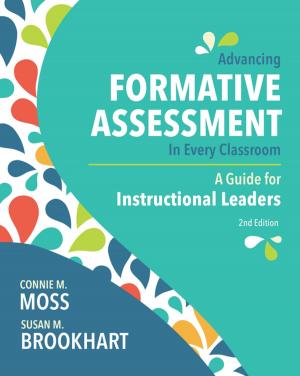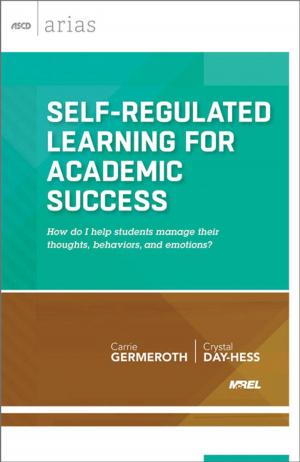Students at the Center
Personalized Learning with Habits of Mind
Nonfiction, Reference & Language, Education & Teaching, Teaching, Teaching Methods| Author: | Bena Kallick, Allison Zmuda | ISBN: | 9781416623274 |
| Publisher: | ASCD | Publication: | January 30, 2017 |
| Imprint: | ASCD | Language: | English |
| Author: | Bena Kallick, Allison Zmuda |
| ISBN: | 9781416623274 |
| Publisher: | ASCD |
| Publication: | January 30, 2017 |
| Imprint: | ASCD |
| Language: | English |
Educators’ most important work is to help students develop the intellectual and social strength of character necessary to live well in the world. The way to do this, argue authors Bena Kallick and Allison Zmuda, is to increase the say students have in their own learning and prepare them to navigate complexities they face both inside and beyond school. This means rethinking traditional teacher and student roles and re-examining goal setting, lesson planning, assessment, and feedback practices. It means establishing classrooms that prioritize
- Voice—Involving students in “the what” and “the how” of learning and equipping them to be stewards of their own education.
- *Co-creation—*Guiding students to identify the challenges and concepts they want to explore and outline the actions they will take.
- Social construction—Having students work with others to theorize, pursue common goals, build products, and generate performances.
- Self-discovery—Teaching students to reflect on their own developing skills and knowledge so that they will acquire new understandings of themselves and how they learn.
Based on their exciting work in the field, Kallick and Zmuda map out a transformative model of personalization that puts students at the center and asks them to employ the set of dispositions for engagement and learning known as the Habits of Mind. They share the perspectives of educators engaged in this work; highlight the habits that empower students to pursue aspirations, investigate problems, design solutions, chase curiosities, and create performances; and provide tools and recommendations for adjusting classroom practices to facilitate learning that is self-directed, dynamic, sometimes messy, and always meaningful.
Educators’ most important work is to help students develop the intellectual and social strength of character necessary to live well in the world. The way to do this, argue authors Bena Kallick and Allison Zmuda, is to increase the say students have in their own learning and prepare them to navigate complexities they face both inside and beyond school. This means rethinking traditional teacher and student roles and re-examining goal setting, lesson planning, assessment, and feedback practices. It means establishing classrooms that prioritize
- Voice—Involving students in “the what” and “the how” of learning and equipping them to be stewards of their own education.
- *Co-creation—*Guiding students to identify the challenges and concepts they want to explore and outline the actions they will take.
- Social construction—Having students work with others to theorize, pursue common goals, build products, and generate performances.
- Self-discovery—Teaching students to reflect on their own developing skills and knowledge so that they will acquire new understandings of themselves and how they learn.
Based on their exciting work in the field, Kallick and Zmuda map out a transformative model of personalization that puts students at the center and asks them to employ the set of dispositions for engagement and learning known as the Habits of Mind. They share the perspectives of educators engaged in this work; highlight the habits that empower students to pursue aspirations, investigate problems, design solutions, chase curiosities, and create performances; and provide tools and recommendations for adjusting classroom practices to facilitate learning that is self-directed, dynamic, sometimes messy, and always meaningful.















